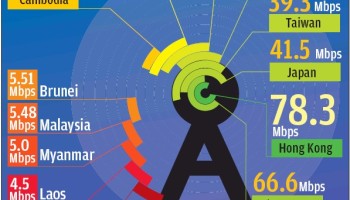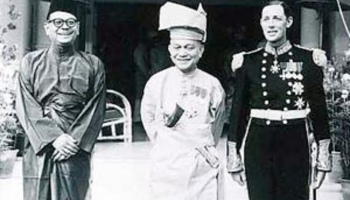 |
Still waiting: Some existing users are
exasperated as they have yet to enjoy the higher broadband speeds
promised by their service providers.
|
Broadband users also complain of not enjoying lower prices
PETALING JAYA: The telcos may have announced lower prices and faster Internet speeds, but many existing fixed broadband users are complaining that they have yet to enjoy these benefits.
On Sunday, the Malaysian Communications and Multimedia Commission (MCMC) announced that Telekom Malaysia (TM), Maxis, Celcom and Time have introduced new entry-level plans below RM100 that are more than 30% cheaper.
But the price reduction and speed increase brought about by the Mandatory Standard on Access Pricing (MSAP), which was implemented on June 8, have yet to trickle down to consumers.
Communications and Multimedia Minister Gobind Singh Deo said in a statement he was aware that not all existing fixed broadband users are enjoying higher speeds and lower prices.
“I found that the packages do not lower the price of services to existing customers. This means that they cannot benefit from the new packages immediately,” said Gobind.
“I will meet with the telco representatives to discuss this matter in the near future. At the same time, I would also like to emphasise that telcos that have offered the new packages should ensure the services are actually implemented.”
Gobind said MCMC is required to monitor the implementation of the new plans and manage all complaints received and to take firm action where necessary to ensure that the services provided are in line with what was promised.
MaxisOne Home Fibre subscriber Leela Krishnan is disappointed that she has yet to receive any update from Maxis.
“No SMS, e-mail or call from the company to tell how MSAP would affect my monthly bill, or what new plans are available for me,” said the graphics designer, 44.
Maxis said the upgrade was not automatic for existing customers as they have to first pick one of two plans – 30Mbps at RM89 or 100Mbps at RM129 per month.
They can do so at the Maxis page, bit.ly/2gacJxB, but will be recontracted for 24 months. Also, customers who break the new contract will incur a RM500 penalty.
Maxis said recontracting is necessary as it is providing a new router which is capable of maximising the higher speed for WiFi, and at no cost to the consumer.
Astro IPTV customers have also been left hanging on the status of their packages as the company has yet to announce anything.
Idzla Hafiz, 34, who is using the Astro IPTV 10 package, said he is paying RM148 for a mere 10Mbps broadband speed, and he has not received any updates.
“I hope I won’t be paying the same amount next month because that means I will be spending RM59 more than Maxis users and still get a lower speed,” he said.
An Astro spokesman told The Star that the company is still in discussion with its broadband partners – Time and Maxis.
“Discussions are progressing well and we hope our broadband partners will extend the same benefits to our Astro IPTV customers,” the spokesman said, adding that it hopes to make an announcement soon.
Meanwhile, TM’s free upgrade for existing users, which started in August, is expected to go on until the first quarter of next year, as it says it has over 800,000 subscribers to upgrade.
Unifi Home 20Mbps or lower subscribers will be upgraded to 100Mbps, 30Mbps to 300Mbps, 50Mbps to 500Mbps and 100Mbps to 800Mbps.
Public relations consultant Daniel Yao, a Unifi customer of seven years, said it is “ridiculous” that Unifi introduced a cheaper plan for new users but long-time users are still stuck in the same plans.
He said Unifi informed him that the only way to opt for the cheaper and faster plan is to terminate his current package and sign up for a new one.
“That means I need to sign a new contract and redo the whole thing at a TM office,” he added.
TM’s Streamyx customers, especially in the outskirts, have also been complaining to MCMC on Twitter that they are still not being upgraded to Unifi and are being forced to pay more for lower speeds due to lack of infrastructure.
“I found out that there are no suggestions provided to address the issues faced by existing Streamyx users, therefore this is something I need to tackle immediately,” said Gobind.
As at press time, TM has yet to respond to queries from The Star.
Celcom, which offers its Home Fibre plans only in Sabah, said it has upgraded all existing customers to the higher speeds and lower prices since September without recontracting.
All its Home Fibre users, starting from 10Mbps, were upgraded to 100Mbps, and their bill reduced to RM120 per month.
The telco said those who have yet to receive their upgrades can contact its customer service line at 1-300-11-3282.
 Time also claims that it has upgraded all its existing users and notified them via e-mail.
Time also claims that it has upgraded all its existing users and notified them via e-mail.The 100Mbps plan (RM149) was upgraded to 500Mbps (RM139) while the 300Mbps (RM189) and 500Mbps (RM299) plans were both upgraded to 1Gbps (RM189).
However, the new subscription fees will only be reflected in bills that are issued from Oct 15 onwards.
If users are still facing slow speeds, it recommends that they restart their router and perform another speed test.
It is best done via a desktop or laptop connected to the router via an Ethernet cable, as users may not be able to get the full speed via WiFi.
If nothing works, users can get in touch with Time via 1800-18-1818 or cs@time.com.my.
Source: The Star by angelin yeoh, mei mei chu, and sharmila nair
Related:
Broadband prices come down - Nation
You can now get Unifi Pro 100Mbps with unlimited data for RM129 ...
Bringing telecom industry up to speed - Business News
Related posts:












